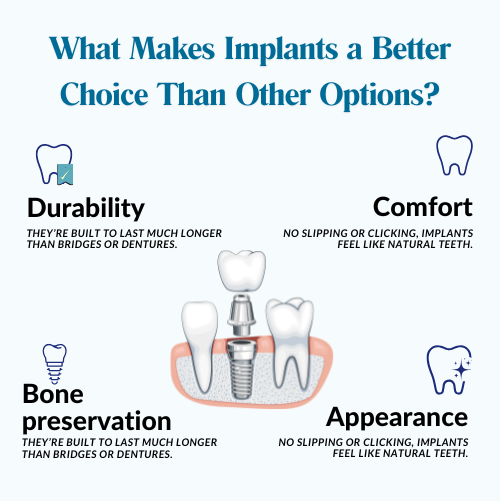Dental implants have become one of the most trusted and effective ways to replace missing teeth. But if you’re considering getting them or already have one, one of the most common questions is: How long do they actually last? The short answer? With the right care, dental implants can last decades… or even a lifetime.
In this article, we’ll break down how long implants usually last, what factors can influence their durability, and how you can help yours stay strong for years to come.
What’s the Typical Lifespan of a Dental Implant?

Dental implants are designed to be a long-term solution. The implant post, which is surgically placed into the jawbone, can last a lifetime when maintained properly. However, the crown—the visible part of the implant usually needs to be replaced every 10 to 15 years due to regular wear and tear.
That said, many people keep their full implants (post and crown) in great shape for 25 years or more with consistent care. Compared to dentures or bridges, implants are more stable and preserve the natural bone by stimulating the jaw, making them an excellent long-term option.
What Makes Implants a Better Choice Than Other Options?
While every smile is unique, dental implants often stand out for several reasons:
- Durability – They’re built to last much longer than bridges or dentures.
- Comfort – No slipping or clicking, implants feel like natural teeth.
- Bone preservation – They help prevent bone loss by bonding with your jaw.
- Appearance – Custom-made to match your smile perfectly.
Factors That Affect How Long Implants Last
1. Daily Dental Care
Keeping up with your oral hygiene routine is one of the most important parts of protecting your implant.
- Brush twice daily with a soft-bristled toothbrush
- Floss every day to remove food and plaque
- Rinse with antibacterial mouthwash
- Visit your dentist regularly for cleanings and check-ups
If oral care is neglected, it can lead to peri-implantitis, an infection around the implant that threatens its stability.
2. Material Quality Matters
Not all dental implants are made from the same materials. The type used can impact how well the implant performs over time.
- Titanium implants – Strong, biocompatible, and ideal for fusing with bone
- Zirconia implants – Metal-free, highly aesthetic, and durable
Choosing a reputable dentist and high-quality implant materials can make a big difference in the long run.
3. Jawbone Health & Density
For an implant to succeed, it must fuse with healthy jawbone. People with bone loss or low bone density may face challenges.
Solution: In cases where bone is lacking, a bone graft can strengthen the area before implant placement, improving success rates significantly.
4. Lifestyle Habits
Certain habits can compromise your implant’s longevity:
- Grinding your teeth (bruxism): Can put excess pressure on the crown or implant
- Smoking or using tobacco: Slows healing and raises the risk of infection
- Chewing hard items: Ice, pen caps, or hard candy can damage crowns
Pro tip: If you grind your teeth, talk to your dentist about a custom night guard.
5. Medical Conditions
Some health conditions can interfere with healing or bone integration:
- Uncontrolled diabetes
- Osteoporosis
- Chronic gum disease
Being upfront about your health and any medications you’re taking helps your dentist tailor the best approach for a successful outcome.
How to Make Your Implants Last as Long as Possible

If you want your dental implants to go the distance, here are a few habits to adopt:
- Stick to a daily hygiene routine, brushing, flossing, and rinsing
- Keep up with dental appointments
- Avoid tobacco and minimize alcohol
- Use a night guard if you grind your teeth
- Eat a balanced diet rich in nutrients that support bone health
When Might a Dental Implant Need to Be Replaced?
The implant post may last forever, but the crown or abutment might need replacement after a decade or so. Common reasons include:
- Natural wear and tear
- Damage from biting or trauma
- Changes in surrounding teeth or gumline aesthetics
Signs of Implant Trouble
Although rare, implants can occasionally fail. Here’s what to look for:
- Pain or unusual discomfort near the implant
- Swelling, bleeding, or inflamed gums
- A loose feeling or shifting in the implant
- Trouble biting or chewing
Don’t ignore these signs. Early treatment can often prevent the issue from becoming serious.
Final Thoughts: Are Dental Implants a Lifetime Investment?
In many cases, yes! With the right care, dental implants offer a lasting, reliable, and natural-looking solution to tooth loss. But their longevity depends on how well you maintain them and your overall health.
If you’re thinking about dental implants—or want tips on how to care for the ones you have Smile 1 Dental is here to help. Schedule a consultation with a board-certified dentist in Spring, TX, and take the next step toward a smile that stands the test of time.

